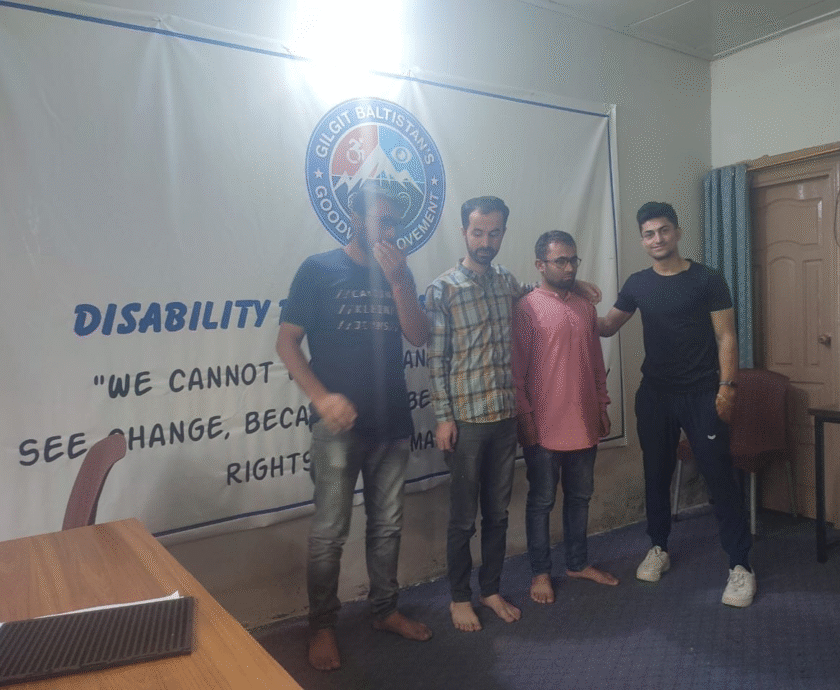Nestled amidst the awe-inspiring peaks of the Himalayas and Karakoram, Gilgit-Baltistan is often celebrated for its breathtaking natural beauty: however, beneath the serene landscapes and picturesque vistas lies a harrowing reality that plagues the lives of many disabled individuals in the region – domestic abuse driven by wealth and property disputes.
This article aims to shed light on the grim experiences of disabled people in Gilgit-Baltistan who face domestic abuse due to property-related conflicts.
Understanding the Context
Domestic abuse is a grave issue that affects countless lives worldwide, irrespective of gender, age, or disability. In Gilgit-Baltistan, where issues related to land and property hold immense importance in the social fabric, disabled individuals often find themselves particularly vulnerable to abuse when these disputes arise. For instance, in the image, you see someone who has some form of disability. clearly being beaten up by an ableist.
Property as a Precursor to Abuse
Property and land disputes are common in the region due to various historical, cultural, and legal factors. In cases where a disabled individual holds a stake in such disputes, they are frequently targeted by family members seeking control over valuable assets. This leads to a disturbing cycle of abuse, with the disabled person subjected to physical, emotional, and psychological torment.
Economic Dependency
Many disabled individuals in Gilgit-Baltistan face economic dependency on their families due to limited employment opportunities and inadequate disability support systems. This economic vulnerability makes them easy prey in property-related conflicts. When disputes arise, family members may view the disabled individual as a hindrance to their financial gain and resort to abuse as a means of asserting control.
Forms of Abuse
The abuse faced by disabled individuals in Gilgit-Baltistan takes various forms, including:
- Physical Abuse: Disabled individuals may be physically assaulted, sometimes leading to severe injuries and long-lasting trauma.
Emotional Abuse: They often endure emotional torment, including constant belittlement, humiliation, and isolation from social activities.
Psychological Abuse: Disabled individuals may suffer from severe psychological distress, including anxiety and depression, as a result of the abuse they endure.
Financial Exploitation:
Family members may mismanage or withhold financial resources that are essential for the disabled person’s well-being.
Forced Isolation:
Disabled individuals may be forcibly isolated, further exacerbating their vulnerability and limiting their access to help and support. Disabled individuals may be forcibly isolated, further exacerbating their vulnerability and limiting their access to help and support.
What’s the way forward
- Legal Reforms: Stricter laws and regulations must be implemented to protect the rights of disabled individuals, particularly in property disputes. Legal recourse should be accessible and efficient.
- Awareness Campaigns: Raising awareness about the rights and vulnerabilities of disabled individuals is crucial. Community awareness programs can help change attitudes and promote empathy.
- Support Services: Establishing support systems, including counseling and rehabilitation services, is essential for the physical and mental well-being of disabled victims of abuse.
- Economic Empowerment: Creating opportunities for disabled individuals to gain financial independence can reduce their vulnerability in property disputes.
- Community Involvement: Engaging community leaders and elders in resolving property conflicts peacefully and without resorting to abuse is vital.
Conclusion
The serene landscapes of Gilgit-Baltistan may hide the silent suffering of disabled individuals caught in the web of domestic abuse and property disputes. It is incumbent upon society, government, and local authorities to come together and ensure that these vulnerable individuals are protected and their rights are upheld. Only then can the region truly celebrate its natural beauty with a clear conscience, knowing that it does not come at the cost of human suffering




